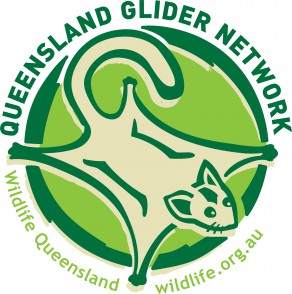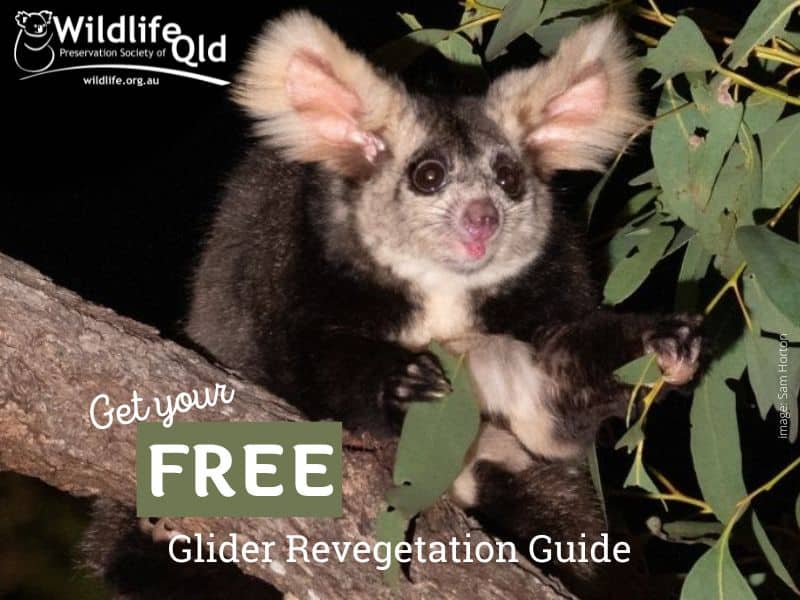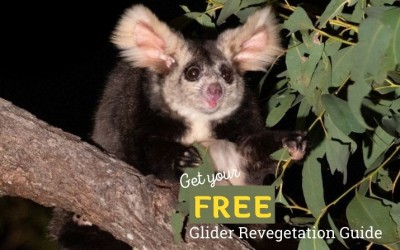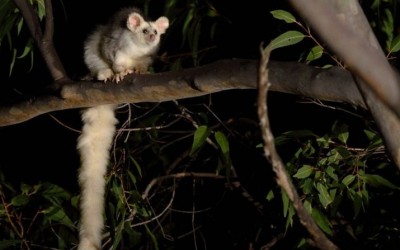Queensland
Glider Network
© Josh Bowell
The Queensland Glider Network (QGN) was established in early 2006 to support glider populations by being a statewide hub for communication, education, data collection, mapping, and information exchange.

glider species found in Australia
Our aims
Australia and parts of South-East Asia are home to the world’s only gliding marsupials. The smallest glider species, the feathertail glider (Acrobates pygmaeus), and the largest, the southern and central greater glider (Petauroides volans), both rely on the eucalypt forests and woodlands of eastern Australia.
Vegetation clearing, along with a climate change-induced increase in the frequency and severity of bushfires, has driven declines in all glider species. However, greater gliders and yellow-bellied gliders (Petaurus australis), which are especially sensitive to habitat disturbance, have suffered the most. Both greater gliders and yellow-bellied gliders are now threatened under Commonwealth and Queensland legislation.
The goal of the QGN is to raise awareness of gliders and their habitat requirements in all Queensland local government areas to improve community knowledge and interest in these fascinating marsupials.
We aim to do this by:
- promoting glider-friendly landscape management
- enhancing habitat within remnant glider populations
- implementing monitoring programs for local glider populations
- working with state and local governments to implement conservation projects, develop programs and support communities in the restoration of habitat
- educating communities and raising awareness of the importance of gliders via workshops, webinars, and spotlighting events
- partnering with numerous landcare and habitat rehabilitation groups to restore vital glider habitat.
Current projects
No Results Found
The page you requested could not be found. Try refining your search, or use the navigation above to locate the post.
Ongoing activities
QGN is currently working with local councils, landcare and conservation groups on various projects.
Additional ongoing QGN activities include:
- spotlighting events
- supporting scientific research
- hands-on school projects
- presentations to youth and community groups
- educational publications.
Get involved
report a sighting
Spotted a glider in the wild? Contribute to our work by reporting your sighting
FOLLOW US
Follow our Queensland Glider Network Facebook page for the latest glider news.
Adopt a glider
Support QGN by symbolically adopting a glider with a tax-deductible donation
QGN resources
Species profiles
- Feathertail gliders — broad-toed feathertail glider (Acrobates frontalis) and narrow-toed feathertail glider (Acrobates pygmaeus)
- Sugar gliders — Petaurus breviceps, Petaurus notatus, and Petaurus ariel
- Squirrel glider — Petaurus norfolcensis
- Mahogany glider — Petaurus gracilis
- Yellow-bellied glider — Petaurus australis
- Greater gliders — central and southern greater glider (Petauroides volans) and northern greater glider (Petauroides minor)
Fact sheets & guides
Videos, webinars & picture books
QGN webinars
- Threatened Glider Recovery web page. Watch Webinar recording
- Greater Gliders web page. Watch webinar recording
- Glorious Gliders web page. Watch webinar recording
Further reading
Articles & papers
- McGregor, D.C., Padovan, A., Georges, A. et al. Genetic evidence supports three previously described species of greater glider, Petauroides volans, P. minor, and P. armillatus. Sci Rep 10, 19284 (2020), accessed 9 February 2021. Genetic evidence supports three previously described species of greater glider, Petauroides volans, P. minor, and P. armillatus | Scientific Reports (nature.com) Sci Rep 10, 19284 (2020), accessed 9 February 2021. Published: .
- Integrative taxonomic investigation of Petaurus breviceps (Marsupialia: Petauridae) reveals three distinct species, Teigan Cremona, Andrew M Baker, Steven J B Cooper, Rebecca Montague-Drake, Alyson M Stobo-Wilson, Susan M Carthew, Zoological Journal of the Linnean Society, zlaa060, https://doi.org/10.1093/zoolinnean/zlaa060 Published: 13 July 2020.
Revegetate to save our threatened gliders
A Revegetation Guide to the Threatened Gliders of Southern Queensland explains the habitat needs of Queensland’s two largest gliding marsupials — the greater glider and the yellow-bellied glider — and what you can do to help them, particularly in regions affected by the 2019–2020 bushfires.
Downloaded the guide as a PDF document.
Or Email us to request a printed copy.
Latest QGN news
Download our comprehensive new guide to revegetating for gliders today!
Exciting news … Wildlife Queensland’s Queensland Glider Network (QGN) has launched a brand-new, comprehensive guide to revegetating private properties to support the conservation of large threatened gliders in southern Queensland.
Queensland Glider Network shines with greater glider events in bushfire-affected regions
Wildlife Queensland’s Queensland Glider Network (QGN) is rolling out a series of free half-day workshops to encourage landholders to help conserve threatened greater gliders and yellow-bellied gliders … and they’re so popular they’re attracting ‘glider groupies’.
Greater Glider ‘Dine & Shine’ Crows Nest
Join guest presenters Paul Revie (Qld Glider Network), Jessica Lovegrove-Walsh (Friends of Nerang National Park), as well as the crew from Geckoes Wildlife Presentations for a FREE half-day educational glider workshop and optional nighttime spotlighting at Crows Nest, near Toowoomba.




